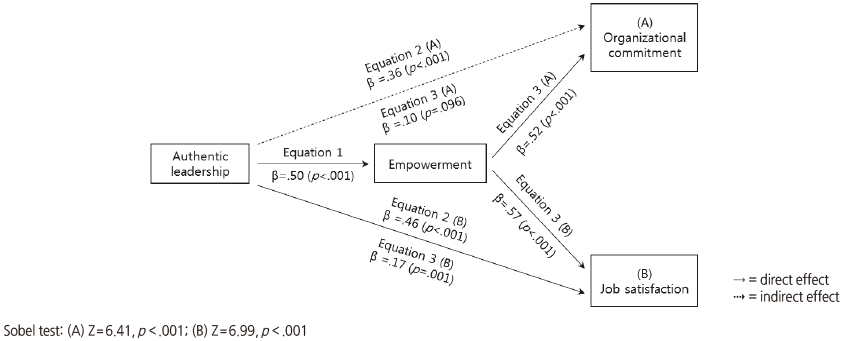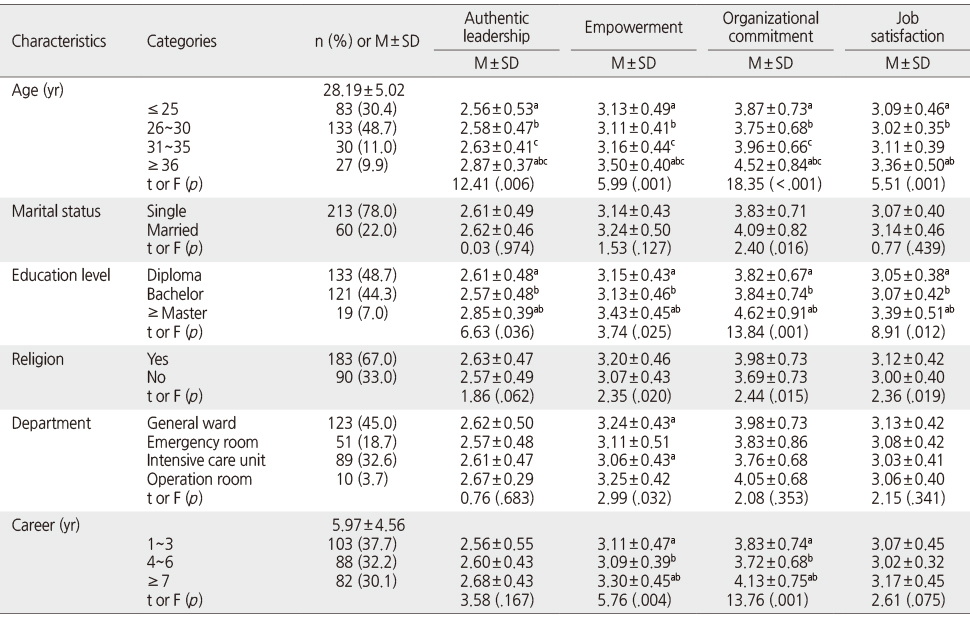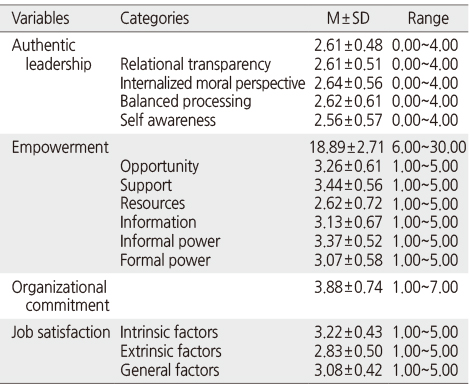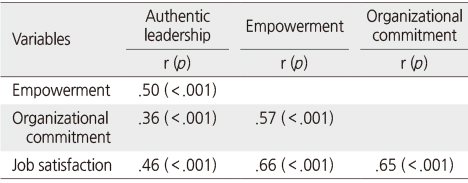Articles
- Page Path
- HOME > J Korean Acad Nurs > Volume 46(1); 2016 > Article
-
Original Article
- Influence of Nurse Managers' Authentic Leadership on Nurses' Organizational Commitment and Job Satisfaction: Focused on the Mediating Effects of Empowerment
- Han-Gyo Choi, Sung Hee Ahn
-
Journal of Korean Academy of Nursing 2016;46(1):100-108.
DOI: https://doi.org/10.4040/jkan.2016.46.1.100
Published online: February 29, 2016
College of Nursing, The Catholic University of Korea, Seoul, Korea.
- Address reprint requests to: Ahn, Sung Hee. College of Nursing, The Catholic University of Korea, 222 Banpo-daero, Seocho-gu, Seoul 06591, Korea. Tel: +82-2-2258-7409, Fax: +82-2-2258-7772, shahn@catholic.ac.kr
© 2016 Korean Society of Nursing Science
This is an Open Access article distributed under the terms of the Creative Commons Attribution NoDerivs License. (http://creativecommons.org/licenses/by-nd/4.0/) If the original work is properly cited and retained without any modification or reproduction, it can be used and re-distributed in any format and medium.
Abstract
-
Purpose
- The aim of this study was to examine the mediating effect of empowerment in the relationship of nurse managers' authentic leadership, with nurses' organizational commitment and job satisfaction.
-
Methods
- The participants in this study were 273 registered nurses working in five University hospitals located in Seoul and Gyeonggi Province. The measurements included the Authentic Leadership Questionnaire, Condition of Work Effectiveness Questionnaire-II, Organizational Commitment Questionnaire and Korea-Minnesota Satisfaction Questionnaire. Data were analyzed using t-test, ANOVA, Scheffé test, Pearson correlation coefficients, simple and multiple regression techniques with the SPSS 18.0 program. Mediation analysis was performed according to the Baron and Kenny method and Sobel test.
-
Results
- There were significant correlations among authentic leadership, empowerment, organizational commitment and job satisfaction. Empowerment showed perfect mediating effects in the relationship between authentic leadership and organizational commitment. It had partial mediating effects in the relationship between authentic leadership and job satisfaction.
-
Conclusion
- In this study, nurse managers' authentic leadership had significant influences on nurses organizational commitment and job satisfaction via empowerment. Therefore, to enhance nurses' organizational commitment and job satisfaction, it is necessary to build effective strategies to enhance nurse manager's authentic leadership and to develop empowering education programs for nurses.
This manuscript is a revision of the first author's master's thesis from the Catholic University of Korea.
The authors declared no conflict of interest.
- 1. Gardner WL, Avolio BJ, Luthans F, May DR, Walumbwa F. "Can you see the real me?" self-based model of authentic leader and follower development. Leadersh Q. 2005;16(3):343–372.
- 2. Walumbwa FO, Avolio BJ, Gardner WL, Wernsing TS, Peterson SJ. Authentic leadership: Development and validation of a theory-based measure. J Manage. 2008;34(1):89–126. ArticlePDF
- 3. Avolio BJ, Gardner WL. Authentic leadership development: Getting to the root of positive forms of leadership. Leadersh Q. 2005;16(3):315–338. Article
- 4. Kernis MH. Toward a conceptualization of optimal self-esteem. Psychol Inq. 2003;14(1):1–26.
- 5. Jensen SM, Luthans F. Entrepreneurs as authentic leaders: Impact on employees' attitudes. Leadersh Organ Manage J. 2006;27(8):646–666. Article
- 6. Wong CA, Laschinger HKS. Authentic leadership, performance, and job satisfaction: The mediating role of empowerment. J Adv Nurs. 2013;69(4):947–959. ArticlePubMed
- 7. Allen NJ, Meyer JP. The measurement and antecedents of affective, continuance and normative commitment to the organization. J Occup Psychol. 1990;63(1):1–8. Article
- 8. Park HH, Park KS, Yom YH, Kim KH. Impact of clinical nurses' power and empowerment on job satisfaction and organizational commitment. J Korean Acad Nurs. 2006;36(2):244–254.ArticlePDF
- 9. Weiss DJ, Dawis RV, England GW, Lofquist LH. Manual for the Minnesota satisfaction questionnaire. Minneapolis, MN: University of Minnesota, Industrial Relations Center; 1967.
- 10. Kanter RM. Men and women of the corporation. New York, NY: Basic Books; 1977.
- 11. Laschinger HKS, Wong CA, Grau AL. The influence of authentic leadership on newly graduated nurses' experiences of workplace bullying, burnout and retention outcomes: A cross-sectional study. Int J Nurs Stud. 2012;49(10):1266–1276. ArticlePubMed
- 12. Lee YM, Kim BM. The mediator effect of empowerment in relationship between transformational leadership and organizational commitment. J Korean Acad Nurs. 2008;38(4):603–611. Article
- 13. Shirey MR. Authentic leaders creating healthy work environments for nursing practice. Am J Crit Care. 2006;15(3):256–267.ArticlePubMedPDF
- 14. Faul F, Erdfelder E, Buchner A, Lang AG. Statistical power analyses using G*Power 3.1: Tests for correlation and regression analyses. Behav Res Methods. 2009;41(4):1149–1160. ArticlePubMedPDF
- 15. Avolio BJ, Gardner WL, Walumbwa FO. Authentic leadership questionnaire [Internet]. Menlo Park, CA, Mind Garden Inc.. 2015;cited 2015 January 26. Available from: http://www.mindgarden.com/products/alqconsult.htm
- 16. Choi HS, Lee JS. A study on the validation of authentic leadership questionnaire in Korean corporate sites. J Lifelong Educ HRD. 2010;6(3):89–114.Article
- 17. Laschinger HK, Finegan J, Shamian J, Wilk P. Impact of structural and psychological empowerment on job strain in nursing work settings: Expanding Kanter's model. J Nurs Adm. 2001;31(5):260–272.PubMed
- 18. Mowday RT, Steers RM, Porter LW. The measurement of organizational commitment. J Vocat Behav. 1979;14(2):224–247. Article
- 19. Lee MH. Relationship between organizational culture types and organizational effectiveness in hospitals. J Korean Acad Nurs Adm. 1998;4(2):363–385.
- 20. Park IJ. A validation study of the Minnesota satisfaction questionnaire (MSQ) [master's thesis]. Seoul, Seoul National University. 2005.
- 21. Baron RM, Kenny DA. The moderator-mediator variable distinction in social psychological research: Conceptual, strategic, and statistical considerations. J Pers Soc Psychol. 1986;51(6):1173–1182.ArticlePubMed
- 22. Song B, Seomun G. The influential factors related to organizational citizenship behavior of nurses: With focus on authentic leadership and organizational justice. J Korean Acad Nurs Adm. 2014;20(2):237–246. Article
- 23. Oh EH, Chung BY. The effect of empowerment on nursing performance, job satisfaction, organizational commitment, and turnover intention in hospital nurses. J Korean Acad Nurs Adm. 2011;17(4):391–401. Article
- 24. Kim MJ, Kim HY. The impact of social support and self-esteem on nurses' empowerment. J Korean Acad Nurs Adm. 2014;20(5):558–566. Article
- 25. Seo YY, Ju HO. Influence of nursing organizational culture on empowerment as perceived by new nurses. J Korean Acad Nurs Adm. 2011;17(1):88–95. Article
- 26. Oh EH. The effect of nurse empowerment program [dissertation]. Daegu, Kyungpook National University. 2014.
- 27. Kim JH. The substitution effect of leadership substitutes for transformational leadership in nursing organization. J Korean Acad Nurs. 2006;36(2):361–372.ArticlePDF
- 28. Conger JA, Kanungo RN. The empowerment process: Integrating theory and practice. Acad Manage Rev. 1988;13(3):471–482. Article
- 29. Eo YS, Kim YH, Lee NY. Path analysis of empowerment and work effectiveness among staff nurses. Asian Nurs Res. 2014;8(1):42–48. Article
REFERENCES
Model showing the influence of authentic leadership on organizational commitment and job satisfaction, and the mediating effect of empowerment.

Differences in Authentic Leadership, Empowerment, Organizational Commitment, and Job Satisfaction by General Characteristics of Participants (N=273)

Level of Authentic Leadership, Empowerment, Organizational Commitment, and Job Satisfaction (N=273)

Figure & Data
REFERENCES
Citations

- Effect of Nursing Managers’ Ethical Leadership on Clinical Nurse Empowerment, Performance, and Organizational Commitment
Jihun Kim, Seok Hee Jeong, Hee Sun Kim, Myung Ha Lee
Journal of Nursing Research.2025; 33(4): e400. CrossRef - Authentic leadership, work-family enrichment and nurses’ life satisfaction
Omar Faroque
International Journal of Organizational Analysis.2025;[Epub] CrossRef - Cross cultural adaptation and psychometric validation of the Persian version of the integral nursing leadership scale
Amir Jalali, Keivan Moradi, Azam Sharifi, Keivan Babaei, Mostafa Bafandeh Zendeh, Amirhossein Naghibzadeh, khalil Moradi
Scientific Reports.2025;[Epub] CrossRef - Factors Influencing Burnout of Nurses in Comprehensive Nursing Care Service Wards: Focusing on Positive Psychological Capital, Role Conflict, and Authentic Leadership
Jung Wha Park, Kyoung Ja Kim, Ji Young Im, Ji Young Kim
Journal of Korean Academy of Nursing Administration.2025; 31(4): 345. CrossRef - Organizational commitment of nursing staff: Definition of the concept and specifics of measurement (review of foreign publications)
K. V. Kuzmin, L. E. Petrova, V. S. Kharchenko
Kuban Scientific Medical Bulletin.2025; 32(5): 96. CrossRef - Perceived Academic Team Leaders’ Authentic Leadership and Team Members’ Psychological Safety: A Cross‐Sectional Online Survey
Majd T. Mrayyan, Younjae Oh
Journal of Nursing Management.2024;[Epub] CrossRef - Authentic Leadership in Nursing From 2006 to 2022: A Bibliometric Analysis and Visualization Analysis
Jing Gao, Tingting Huang, Yao Xu, Tao Li
American Journal of Health Behavior.2024; 48(1): 167. CrossRef - A General Overview of Studies on Authentic Leadership (1978-2022): A Bibliometric Analysis
Mehmet Sabir Çevik
Bartın University Journal of Faculty of Education.2024; 13(4): 1083. CrossRef - The Leadership Experience of Advanced Practice Nurses in a Tertiary Hospital Setting : Focus Group Interview
Eun Sook Kim, Nayeon Kim, Su Jung Choi, Nari Kim, Young Hee Kim, Jung Yoon Lee, Eun-Hye Kim
Journal of Korean Critical Care Nursing.2023; 16(3): 48. CrossRef - Effects of Nursing Unit Managers’ Authentic Leadership, Transformational Leadership, and Transactional Leadership on Turnover Intention in Advanced Beginner Nurses: Mediation Effects of Positive Psychological Capital
Eun Jeong Kim, Eungyung Kim, Son Ja Lee
Journal of Korean Academy of Nursing Administration.2023; 29(4): 409. CrossRef - How does authentic leadership influence the safety climate in nursing?
Majd T Mrayyan, Nijmeh AL-Atiyyat, Sami Al-Rawashdeh, Abdullah Algunmeeyn, Hamzeh Y Abunab, Wafa'a W Othman, Mohammad N Sayaheen
BMJ Leader.2023; 7(3): 189. CrossRef - Nurses’ authentic leadership and their perceptions of safety climate: differences across areas of work and hospitals
Majd T. Mrayyan, Nijmeh Al-Atiyyat, Sami Al-Rawashdeh, Abdullah Algunmeeyn, Hamzeh Y. Abunab
Leadership in Health Services.2022; 35(3): 372. CrossRef - The relationship between organizational commitment and work engagement among clinical nurses in China: A cross‐sectional study
Ping Tang, Xiangeng Zhang, Fen Feng, Junwen Li, Li Zeng, Wanqing Xie, Man Jin, Jialin Wang
Journal of Nursing Management.2022; 30(8): 4354. CrossRef - Nursing leaders' perceptions of the state of nursing leadership and the need for nursing leadership education reform: A qualitative content analysis from South Korea
Hae‐Ok Kim, Insook Lee, Byoung‐Sook Lee
Journal of Nursing Management.2022; 30(7): 2216. CrossRef - Development and Evaluation of the “High-Up” Program for Enhancing the Nursing-Management Competency of Mid-Career Hospital Nurses: A Quasi-Experimental Study
Seulki Kim, Ji-Young Lim
International Journal of Environmental Research and Public Health.2022; 19(7): 4392. CrossRef - Factors Affecting Patient Safety Culture of Clinical Nurses: Focusing on Authentic Leadership and Team effectiveness
Tae Wha Lee, Phill Ja Kim, Hye Young Lee, Hae Kyung Shin, Hyun Sim Lee, Yoona Choi
Journal of Korean Academy of Nursing Administration.2021; 27(1): 34. CrossRef - Effects of Positive Psychological Capital, Social Support and Head Nurses' Authentic Leadership on Organizational Commitment of Nurses at the Advanced Beginner Stage
Hye Sook Kwon, Yeongmi Ha
Journal of Korean Academy of Nursing Administration.2020; 26(3): 284. CrossRef - Structural empowerment is a strong predictor of organizational commitment in nurses: A systematic review and meta‐analysis
Konstantinos C. Fragkos, Pinelopi Makrykosta, Christos C. Frangos
Journal of Advanced Nursing.2020; 76(4): 939. CrossRef - Mediator Effect of Perceived Organizational Support in the Relationship between Authentic Leadership and Organizational Commitment
Elif BAYKAL
MANAS Sosyal Araştırmalar Dergisi.2020; 9(3): 1674. CrossRef - Positive aspects of authentic leadership in nursing work: integrative review
Vanessa Gomes Maziero, Andrea Bernardes, Eline Aparecida Vendas Righetti, Wilza Carla Spiri, Carmen Silvia Gabriel
Revista Brasileira de Enfermagem.2020;[Epub] CrossRef - A Meta-Analytic Path Analysis on the Outcome Variables of Nursing Unit Managers' Transformational Leadership: Systemic Review and Meta-Analysis
Sunmi Kim, Seok Hee Jeong
Journal of Korean Academy of Nursing.2020; 50(6): 757. CrossRef - The impact of person‐centred care on job productivity, job satisfaction and organisational commitment among employees in long‐term care facilities
Ching‐Yuan Huang, Rhay‐Hung Weng, Tsung‐Chin Wu, Ching‐Tai Hsu, Chiu‐Hsia Hung, Yu‐Chen Tsai
Journal of Clinical Nursing.2020; 29(15-16): 2967. CrossRef - Authentic leadership outcomes in detail-oriented occupations: Commitment, role-stress, and intentions to leave
Elad Kalay, Yael Brender-Ilan, Jeffrey Kantor
Journal of Management & Organization.2020; 26(5): 832. CrossRef - The mediating role of organizational commitment between calling and work engagement of nurses: A cross-sectional study
Yudi Cao, Jingying Liu, Kejia Liu, Mengyu Yang, Yanhui Liu
International Journal of Nursing Sciences.2019; 6(3): 309. CrossRef - Effect of Head Nurses' Authentic Leadership on Nurses' Job Satisfaction and Nursing Performance: Focusing on the Mediating Effects of Empowerment
Mi-Jeong Kim, Ji-Young Han
Journal of Korean Academy of Nursing Administration.2019; 25(1): 25. CrossRef - The antecedents and consequences of psychological capital: a meta-analytic approach
Wann-Yih Wu, Khanh-Van Ho Nguyen
Leadership & Organization Development Journal.2019; 40(4): 435. CrossRef - Structural empowerment and nurses’ patient identification behaviors: a cross-sectional study
Young Mee Kim, Se Young Kim
International Journal of Health Care Quality Assurance.2019; 32(5): 832. CrossRef - The Effects of Corporate Social Responsibility on Job Performance: Moderating Effects of Authentic Leadership and Meaningfulness of Work
Hoe-Chang Yang, Young-Ei Kim
The Journal of Asian Finance, Economics and Business.2018; 5(3): 121. CrossRef - RETRACTED: The Mediating Effect of Social Capital on the Relationship Between Public Health Managers' Transformational Leadership and Public Health Nurses' Organizational Empowerment in Korea Public Health
Soo Young Jun
Asian Nursing Research.2017; 11(4): 246. CrossRef - Effects of Relational Bonds and Professional Authority in the Organizational Commitment of Intensive Care Unit Nurses
Naeyoung Lee, Young Soon Kim
Journal of Korean Academy of Nursing Administration.2017; 23(2): 151. CrossRef - Mediating Effect of Psychological Empowerment on the Relationship of Middle Managers’ Authentic Leadership with the Staff’s Organizational Commitment and Job Satisfaction at the Local Medical Center
Hye-Jin Kim, Seong-Ae Hong
The Korean Journal of Health Service Management.2017; 11(4): 1. CrossRef - Person-Organization Value Congruence between Authentic Leadership of Head Nurses and Organizational Citizenship Behavior in Clinical Nurses
Joung Ok Kim, Se Young Kim
Journal of Korean Academy of Nursing Administration.2017; 23(5): 515. CrossRef - Impact of Self-leadership and Organizational Commitment on the Intention of Psychiatric Mental Health Nurses to Remain in the Profession
Hyun Sook Park
Journal of Korean Academy of Psychiatric and Mental Health Nursing.2016; 25(4): 409. CrossRef

Figure 1
Differences in Authentic Leadership, Empowerment, Organizational Commitment, and Job Satisfaction by General Characteristics of Participants (N=273)
a, b, c: Scheffé test (means with the same letters are significantly different).
Level of Authentic Leadership, Empowerment, Organizational Commitment, and Job Satisfaction (N=273)
Correlational Relationships among the Variables (N=273)
Mediating Effect of Empowerment in the Relationship between Authentic Leadership and Organizational Commitment (N=273)
OC=Organizational commitment.
Mediating Effect of Empowerment in the Relationship between Authentic Leadership and Job Satisfaction (N=273)
JS=Job satisfaction.
a, b, c: Scheffé test (means with the same letters are significantly different).
OC=Organizational commitment.
JS=Job satisfaction.
 KSNS
KSNS
 E-SUBMISSION
E-SUBMISSION



 Cite
Cite

